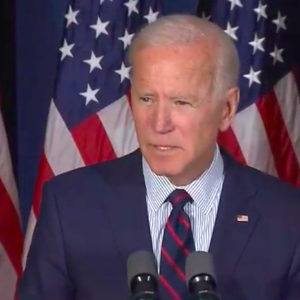President Joe Biden’s first-anniversary press conference should strike alarm in the hearts and minds of the billions around the world who might be concerned about his willingness to stand up for democratic ideals or even American interests abroad. The most concerned should be the hundreds of millions living in Asia who should note he said not a word about defending their interests while stumbling stupidly over what he would do regarding Ukraine.
It’s difficult to say which is more frightening, his remarks on Ukraine or his ignoring Asia after North Korea’s Kim Jong Un had opened the year with a barrage of missile tests and hints at a meeting of the politburo of his ruling Worker’s Party, over which he reigns as general secretary, of tests of long-range missiles and even nuclear warheads. Actually, instead of referring to former President Donald Trump ignoring Asia, perhaps we should say his ignorance of Asia, though the media assembled before him one year after his inauguration also share the blame for not asking about the North’s missile shots or concerns about China’s rising power over the region, including, of course, its satellite, North Korea.
Biden’s blundering over Ukraine does not bode well for the future of U.S. interests anywhere. It wasn’t just his silly remark dismissing “a minor incursion” by the Russians as a detail that “we end up having a fight about what to do and not do, et cetera.”
The White House had no trouble stepping back from that gaffe with cover-ups making clear he wasn’t really giving Russia’s Vladimir Putin the go-ahead for nipping off a piece of territory. Fine, but we’ve got to wonder about the emptiness, the vacuity of the rest of his rambling remarks. What did he mean when he said it would be “a disaster for Russia” if Russian troops invaded Ukraine? And when he warned of “severe costs and significant harm on Russia and the Russian economy,” what was he talking about?
Putin may put off the worst, that is a full-scale invasion of Ukraine, but he’s confident his forces can crash right through Ukraine defenses regardless of all the military aid promised by the U.S. He knows the NATO countries are not going to go to war for Ukraine, under Soviet rule until the breakup of the Soviet Union in 1991, and won’t retaliate with their own forces, on the ground or in the air, militarily. He should be heartened, moreover, by what Biden had to say a few minutes later. “The cost of going into Ukraine, in terms of physical loss of life, is going to be heavy,” he warned, but “they’ll be able to prevail over time.”
In those words, the American president was acknowledging the Russians could have their way in Ukraine if Putin were willing to sacrifice thousands of his troops. Like leaders of other countries, friends of Russia, Iran, and North Korea among them who scoff at sanctions, Putin may not be all that concerned about the loss of lives while willing to risk the economic consequences.
Biden, going into his second year on the job, has shown himself to be a nice guy, a gentleman, soft-spoken and polite in contrast to Trump. But those charming qualities don’t make up for the fact that he appears weak, indecisive, and by no means committed to America’s historic allies.
We got a tragic taste of Biden’s fundamental weakness by his performance last year in Afghanistan, from which he withdrew the few remaining U.S. troops by the end of August. Exposing millions of Afghans to suffering, he was willing to leave the country in the hands of the Taliban after having expressed confidence in the ability of the U.S.-backed regime to defend itself. Interestingly, he did so without consulting America’s allies, notably the British, who had their own forces there for years.
That act of presidential misjudgment and incompetence set a precedent that is disheartening when one considers what we’re up against in Asia. The question ahead is whether Biden is willing to betray America’s allies from NATO to Asia, from Korea and Japan to Southeast Asia, including the Philippines and Thailand.
It’s fine for Biden and his aides to breathe rhetorical defiance after North Korean missile tests, but he has shown himself to be not only unthinking but also untrustworthy on the ground where U.S. defenses are urgently needed. Will the newly-formed AUKUS, the three-hatted pact of Australia, the United Kingdom, and the U.S., have any real meaning in the crunch? And would Biden, as commander-in-chief, be willing to send U.S. forces against China in a confrontation over the independent island province of Taiwan?
Those are questions that Koreans and Japanese have to be asking as they wonder why Biden ignored them in his press conference – and is showing no sign of eagerness to defend either in the face of rising threats of North Korean nukes and missiles.

